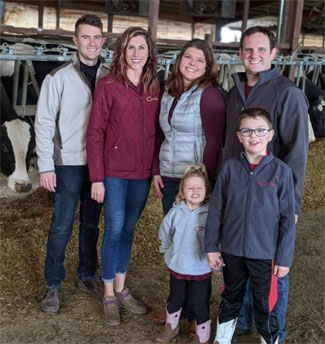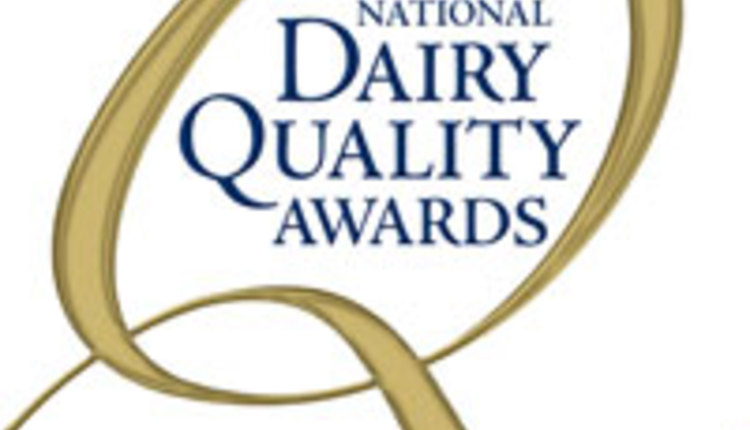
Lauren Brey, along with her husband Jacob, his brother Tony, and sister-in-law Moriah, own and manage Brey Cycle Farm — a 600-cow farm in Sturgeon Bay. All four graduated from the UW–Madison College of Agricultural and Life Sciences: Lauren in food science and life sciences communication, Jacob and Tony in dairy science, and Moriah in life sciences communication. They are dairy farmers who are passionate about caring for their land and animals to make high-quality milk.
Brey Cycle Farm was slated to be one of the host sites this spring on UW–Madison's 2020 Wisconsin Idea Seminar tour, a five-day traveling study tour that immerses forty UW–Madison faculty, academic staff, and administrators in the educational, industrial, social, and political realities of Wisconsin. The farm was selected to highlight how agricultural operations are committed to the health of their animals and the environment.
While this year's Wisconsin Idea Seminar tour had to be postponed due to the coronavirus pandemic, it is slated to take place in 2021, including the stop at Brey Cycle Farm. In the meantime, seminar organizers reached out to Lauren Brey to ask a few questions about how she and her team are continuing to play an essential role in the dairy supply chain amidst this time of uncertainty.
The Q&A below was originally published as part of the Wisconsin Idea Seminar's "Dispatches from Our Own Wisconsin" series, posted at https://wiseminar.wisc.edu/dispatches-from-our-own-wisconsin/, which explores how Wisconsinites across the state are showing remarkable resilience and dedication in the face of this unprecedented pandemic.
In what ways has COVID-19 revealed the needs of your community?
This pandemic has had devastating effects on the entire globe and every business, community and individual in some way. For the dairy community, it has caused a drop in future milk prices because milk is a fresh product and buyers are not interested in taking risk amid all of the uncertainty we are seeing. We have seen challenges in the supply chain, with a decrease in foodservice demand due to restaurants closing, schools not in session (a huge market for fluid milk) and the sharp increase in demand at the retail level. This has forced our processors to try and change their production, which isn’t easy to do on short notice, and also challenged the supply chain in regards to transportation of products. We’re grateful for everyone in the food supply chain who continues to put time in to get food from the farm to the processor to the store shelves.
COVID-19 has also revealed to us how important people are to each other. It seems as if people are overwhelmed or they are lonely, and sometimes both. The generations that typically work together to make families and communities stronger aren’t connected right now in a physical way. There is a real need for human connection.
People want food from a place they trust. People are hungry and seem to be supporting each other more – from all walks of life. We are proud to care for our animals, which produce high-quality, nutritious milk that is made into cheese at a local cheese plant. It is part of a supply chain that starts locally and supports our community, but reaches far beyond our borders as a finished product for many to enjoy.
How have you adapted your daily operations in response to COVID-19?
Despite the pandemic, cows continue to produce milk and need to be cared for 24/7. This means that we need to continue to run our business – a dairy farm – as close to normal as possible. We are grateful to our awesome team of employees who have been healthy and continue to be able to come to work to help us care for our animals. We have reduced the number of meetings and visitors to the farm as much as possible and increased sanitation measures. But, in general, it’s close to business as usual.
Have you seen your community come together in response to COVID-19? If so, how?
Door County is a small, tight-knit community and there are many small, local businesses like ours that are facing uncertainty. Through this we’ve seen our community really come together and help each other out. One way we’ve tried to do our part to support others is by ordering takeout for our employees from local restaurants for lunch to say thank you and support businesses that have had to adjust operations. The humanity that has come out of this is amazing to see. We’re trying to be a small part of that now and are working on plans to have an even bigger impact in the future.
How has COVID-19 strengthened your relationships with others?
Our farm has always been a relationship-driven business. We trust in our advisers, vendors and others to help us make thoughtful decisions. Our employees, suppliers, service providers and fellow farmers are all part of our team that help us succeed. Our farm’s WHY is “To learn and adapt so that all may have a quality life.” It’s important to us to take care of and respect others. The current situation hasn’t changed much about our relationships, but it has reminded us of the importance of doing business the way we do.
Do you have any advice on keeping spirits up during times like these?
Look for the good stories and try to help others. A simple gift to the food pantry, a card or call to someone lonely can mean so much. It doesn’t have to be much to make you feel like you’re contributing to helping someone else through this. There is awesome technology available to help make some of this happen without leaving home.

